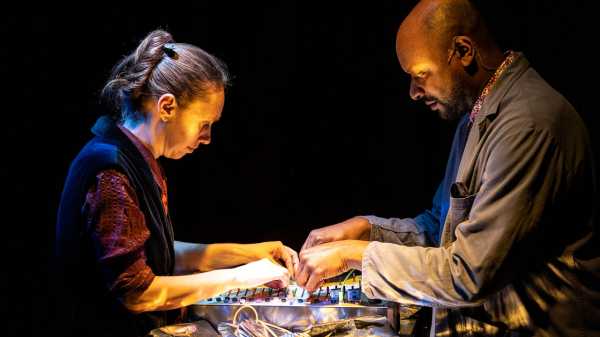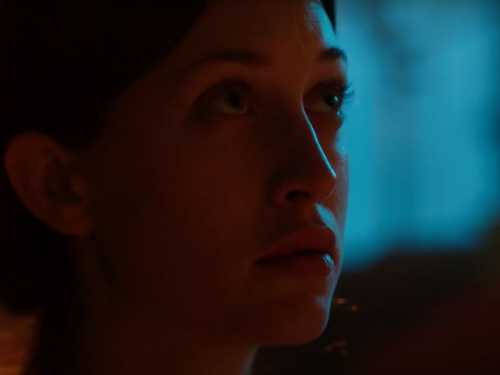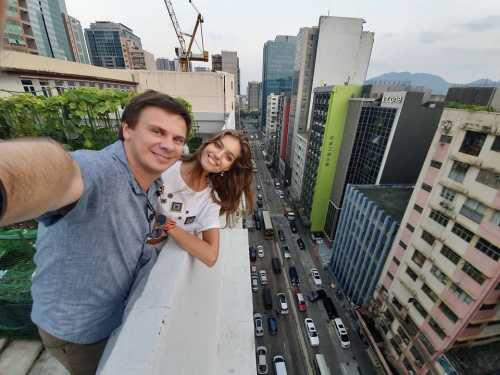
The January performance calendar is like a seasonal migration. In the chill after New Year’s Day, Broadway and Off Broadway go quiet—with the tourists away, very few new productions open uptown. Downtown and farther out, though, there’s a feeding frenzy. The Public Theatre organizes the packed Under the Radar, an international experimental theatre festival, with a side of cabaret offerings at Joe’s Pub; the far-out and dance-forward Exponential Festival, hosted by the Brick, buzzes like an anthill in Brooklyn; and Prototype, dedicated to musical theatre and new opera, pops up in several venues Off Off Broadway.
The activity is back, but things feel delicate, tentative. It’s been several years since we had a full slate of in-person January festivals, and there’s still some recuperating to do. Last year, both Under the Radar and Prototype cancelled less than two weeks before they were supposed to happen; COVID-19-related problems proved impossible to overcome. This year, in the triumphant return, the first weekend of shows exhibited the old bustle, though crowds seemed sparser than in the pre-pandemic era. And already several performances of an Under the Radar show have been cancelled because of illness in the cast.
There’s a dancing-on-the-edge vibe to it all, a sense of courageous frailty. Or do I just think that because I spent the first week of January watching work by artists fantasizing about the end of humanity? In five days of performances, I saw various artists all imagining our extinction. These weren’t exactly post-apocalyptic visions, with the violence and darkness that term implies—most of the shows seemed joyful. They delighted in our disappearance; they savored it.
The composer Gelsey Bell’s “mɔɹnɪŋ [morning//mourning]” song cycle in Prototype (at HERE Arts Center through January 22nd) was the most explicit imagining of the world without us. We’re into humanity’s aftermath as her first notes sound: performers tap their chests to sound like rain or insects; bowed instruments hum and drowse; marbles rattle in a bowl. What killed mankind? Who knows. But zoo animals escape; biomes recover; lions eat the defenseless cows; bacteria eat the microplastics. The singers tell us that they’re looking thousands, then millions of years into the future, as the world cleanses itself from the blight of human life. It’s all, somehow, sweet. The director Tara Ahmadinejad has the performers wander comfortably among the set designer Afsoon Pajoufar’s gilled tables, which look like waist-high chanterelle mushrooms; the lighting designer Masha Tsimring uses foil to make the reflected light ripple, as though we’re seeing the show from underwater. When, after an hour of exquisite singing, a new intelligent species raises itself from the oceans, the toxins have all gone.
It’s there, as the singers are narrating the dawn of the Earth’s new “people,” that Bell’s beautiful imaginative control slips. Until then, archness has generated some necessary tang—she has a great sequence in which the performers, sitting together as if at a campfire, reminisce about humanity’s fun facets. (“I liked ski-jumping from a plane / those guys were insane,” Bell sings in her ethereal folk-yodel, letting her accordion sigh its approval.) The last half hour’s whimsical turn, when the octopus-beings evolve into “blooklungs,” I found less persuasive. When those new tentacled folks went off to space to meet up with aliens, I detached and started to run the piece in reverse in my mind, escaping backward into the real terror-delight that the songs had started out exploring.
I learned that “run it backward” trick from the palindromic “Are we not drawn onward to new erA,” an Under the Radar offering (now closed) that played at Brooklyn Academy of Music. The Belgian performance collective Ontroerend Goed, directed by Alexander Devriendt, spends half the play’s short seventy-minute running time moving cryptically around the stage, greeting one another in garbled near-language, tearing apart a potted tree, erecting a huge statue, and littering the stage with dozens of plastic bags. After filling the stage with smoke, they draw a huge scrim in front of the stage. “This is where we stop this,” a woman says, referring both to the action and, one assumes, to our own environmental ruination. “This is where we are now, all of us.” In response, the screen fills with a film of the previous half hour, but played in reverse. As “time” rewinds, smoke goes back into hoses; the weird language reveals itself as English; the tree is reassembled; the statue is pulled down.
This, like Bell’s “Mourning,” is accepted as a delightful dream. People laughed to see the plastic bags, which had fallen from the ceiling, fly upward in the film—a kind of sacred rapture for litter. Still, it’s disturbing. Once we can understand the words, we hear that the people are agreeing that it’s not enough to replace the trees; true repair requires the humans to remove themselves from the landscape where they do so much damage. Greetings done backward become farewells. The people grinningly wield finger pistols, and one departing woman mimes shooting herself under the chin. Earth’s health and our presence are incompatible. The nature-friendly “new era” that the palindrome-title describes is one where humans cannot go.
This made me think again of the final images from Julian Rosefeldt’s “Euphoria,” a video installation recently shown at the Park Avenue Armory. Rosefeldt projects an immense multichannel film, which includes a series of magic-realist scenarios (a bank where everyone’s an acrobat, a parcel-distribution center suddenly caught in a whirlwind) where actors muse about economics, using a collage script that collides Warren Buffett with Audre Lorde. The piece indicts predatory consumerism—amusingly, given the obvious pile of resources used to make the luxuriously textured thing itself—and, as the cycle of scenarios closes, the last episode shows us a C.G.I. tiger, prowling the darkened aisles of a closed supermarket. The tiger sings about the joy it anticipates in victory—over, one assumes, mankind.
I think the first months of COVID shutdowns—when we sat at home, not polluting the planet as much as usual, marvelling at faked images of dolphins gamboling in the canals of Venice—imprinted deep. The pandemic certainly seems to have given artists an obsession with anthropocide, or at least a taste for self-erasure. In Under the Radar’s participatory “A Thousand Ways (Part Three): An Assembly” (running to January 22nd), the group 600 Highwaymen purges the notion of performance itself—no one from the company is present; the audience must do its own talking. This show is part of a series: in 2021, the company found cunning strategies to continue making theatre when in-person contact was still too risky. “(Part One): A Phone Call” had two audience members conduct a directed telephone conversation with each other, following prompts; in “(Part Two): An Encounter,” pairs of audience members, cued by a stack of notecards, had partly scripted, collaborative interactions, separated by a pane of glass.
In “(Part Three): An Assembly,” which takes place at the New York Public Library’s newly spiffy Stavros Niarchos Foundation Library, the audience is still on its own. Shut into a conference room, sixteen of us read one another directions and questions off a stack of cards. Some were simple—I had to show everyone my wrist, while someone else read a card that told them to sit, and to invite us to be comfortable, too. Others tried to get us to provide our own deep emotion to the project: “Have you recently experienced loss?” one card asked. Boy, had we. There’s an undercurrent of environmental anxiety in “(Part Three),” a few elliptical mentions of a Dust Bowl future, where children outdoors are at terrible risk from passing storms. Again, the artists want us to use the theatre’s suspension of disbelief to imagine ourselves from the standpoint of a devastated future, looking back at our current, still clement time. “It was nice to have preferences,” my card told me to state to the others.
This kindergarten-y approach to climate catastrophe didn’t do it for me. I far preferred Barnett Cohen’s “The Complaint Society,” an abstract piece in the Exponential Festival, in which four dancers moved in lurching, twitching grids and lines, while speaking Cohen’s lively, riddling, anxious libretto. It created the dreamy, passive fear that actually attends our thoughts on these issues: “I guess wildly / I am here today on behalf of the ministry for the future / I welcome your children to our century of hell,” one of the dancers intoned, smiling a little. Cohen’s slippery poetry feels like a printout of the Internet’s mind, with references to porn and adjunct professors and war jumbled up and sorted into stanzas. You can hear Cohen digging down through archeological strata of the way we think: “I have feelings about the feelings of other people / I judge at some remove.” In the post-Anthropocene, it will be hard to reconstitute this soft cultural tissue, this macerated sense of “now.”
By the time Sunday rolled around, I was exhausted by imagining, night after night, the end of humanity. Is this surrender to the idea of decline useful? Or, as I started to wonder darkly, is it decadent? So I was in exactly the mood to roll up to the last performance of “Truth’s a Dog Must to Kennel,” by Tim Crouch, the hugely beloved British solo performer, best known for his international hits “My Arm” and “An Oak Tree.” Bizarrely, given his reputation, there were very few other people at his show, itself the final performance of the International Fringe Encore Series 2022, at the Soho Playhouse.
Crouch’s soft, kind voice took us into a heart of bleakness that those other, bigger shows could only wave at. For parts of his tremendous monologue, Crouch wears a V.R. headset, moving around the stage, narrating the world he can see inside it. He tells us (lying) that he is looking at a recording of a modern-dress production of “King Lear” (“this tarpaulin king,” he calls him), in which he says he played the Fool, and during which he abandoned the part, halfway through a performance. Looking out at us with the black, blank headset over his eyes, he also tells us about the audience he “sees” in the stalls—the schoolboys, the man with the weak heart who ate too much at the pre-theatre dinner, the rascal who has sneaked down from his bad seat in the balcony. “Fair play,” he says, to this phantom image in his headset, and gives him a thumbs-up.
These narrations alternate with Crouch’s wry, diffident version of standup. He takes off the headset and brings out a microphone on a stand, and he tells us jokes that aren’t funny, that are either terribly sad or are viciously, vulgarly anti-royal. He also talks about the theatre itself, and how we have all been lying to ourselves about how “it’ll come back stronger.” It hasn’t really, has it? He shakes his head. Why are we here? Nothing that anyone did in a theatre, anywhere, has prevented any of the terrors that face us now—the ravings of our deposed leaders, the threat of civil war, the storms. Why bother?
But then, back in his headset, he narrates the weird, cruel scene in “Lear” when Edgar, Gloucester’s loving son, tricks his blinded father into a false suicide—Edgar tells him he is jumping off a cliff when he isn’t. As he “watches” the actors do it, that virtual death, Crouch says, leads Gloucester to a kind of enlightenment. There’s a use for such a ruse, even if that use is oblique. It made me think of all those other shows that also ask us to imagine, to pre-experience, our own species’s death. Crouch, one of my favorite theatre thinkers, implies that there’s something to be learned from these experiments—that Gloucester learns something vital as he rehearses his own end. Is that right? Is that what Crouch meant? I wanted to go back to see his show again so I could understand him better. But, of course, he—and it—are gone. ♦
Sourse: newyorker.com






